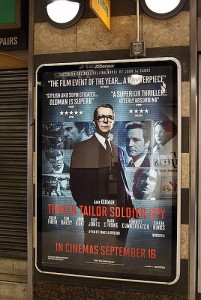The film of the TV series
With the critical and box-office success of Tomas Alfredson’s Tinker, Tailor, Soldier, Spy (which is currently occupying the top position at the British box-office), the trend of creating film adaptations of television mini-series looks set to continue. Tinker, Tailor has, of course, consistently been measured against Arthur Hopcraft’s distillation of the John le Carré novel, which featured an iconic performance by Alec Guinness. In fact, it will be interesting to see whether the trend becomes a two-way street, given the appeal of HBO’s recent mini-series Mildred Pierce, based on the 1945 film noir (directed by Michael Curtiz and based on the novel by James Cain), and the general ability of long-form dramas like Mad Men to retain audiences with sustained attention to character development and prolonged story arcs.
With this in mind it is timely move (as reported in Indie Wire, to which I owe a debt in reminding me of this particular tradition and its British examples) for BBC Films, the BFI and Neal Street Productions to embark on a screen adaptation of the acclaimed 2004 BBC mini-series Conviction. It will be retitled (simply) Blood, and will shoot this January, starring Paul Bettany, Brian Cox and Stephen Graham. Screenwriter Bill Gallagher, whose credits include Clocking Off and Lark Rise to Candleford, is adapting his own material. Both he and director Nick Murphy are relative newcomers to cinema (Murphy was awarded a BAFTA for the BBC Iraq war drama The Occupation, recently blogged about by Jason Jacobs for CST Online).
As Indie Wire noted, it won’t be the first time that a British mini-series “has been retooled for wider audiences”. A famous example is Steven Soderbergh’s Traffik (2000), which was based on the Channel 4 drama series Traffic, which also in turn became an American mini-series (again retaining the conventional spelling) in 2004. In 2006 no less than six movie franchises based on the ITV detective series Rebus were sold by the UK distributor Minotaur. Other, more recent examples of such adaptations are the 2009 film State of Play, which was based on the outstanding BBC series of the same name, first broadcast in 2003 and written by Paul Abbott (who wrote the initial two series of Clocking Off), and Edge of Darkness (the 2010 adaptation of Troy Kennedy-Martin’s 1985 TV series); both these Hollywood versions lacked the scope and originality of their television forbears.
If there is a factor that unites all of these TV/film crossovers it is that they are all tense, realistic dramas with interwoven stories and elements of political intrigue, the police procedural and the conspiracy thriller. Such UK productions are able to compete on the international circuit because of this grit, verve and intelligence, and because of the cachet of the writer, particularly in the case of le Carré and the Rebus novels (written by Ian Rankin). It is interesting to consider whether these film adaptations can and should be called ‘TV movies’, given their provenance. This is a term and concept which has never caught on in Britain, due to the tendency toward relatively highbrow ambitions and values on the part of the BBC and Channel 4 in their film production ventures, and, indeed, due to the success of the mini-series genre itself in this country.
 Learning on Screen
Learning on Screen
